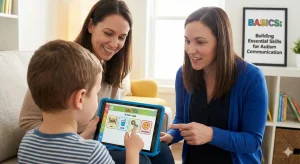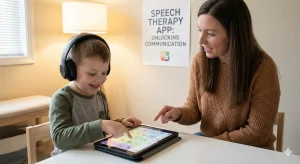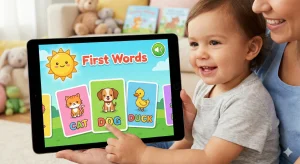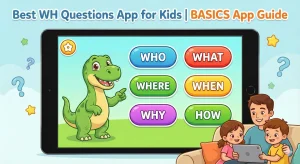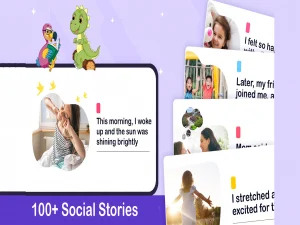10 Communication Tips for Talking to Someone With Aphasia
By Rajini D
Last Updated: June 11, 2025
Struggling to find the right words, follow a conversation, or understand speech can be incredibly frustrating — especially when the person you’re talking to used to communicate just fine. If this sounds familiar, you may be seeing signs of aphasia in someone you care about. Aphasia is a language disorder that affects the way a person speaks, understands, reads, or writes — often after a stroke or brain injury. But here’s something important to remember: aphasia doesn’t affect intelligence. The person still has their thoughts, emotions, and personality — they just have trouble expressing it through words. Talking to someone with aphasia requires patience, empathy, and a few helpful strategies to support better connection.
Improve Your Speech Online
Overcome speech challenges and build your voice with expert online therapy. Regain clarity, fluency, and communication strength.
What Is Aphasia and How Does It Affect Communication?
Talking with someone who has trouble finding words or understanding speech can be confusing — for both of you. If you’re here, you’re likely supporting a loved one who’s experiencing something called aphasia. Let’s break it down simply so you can feel more confident and informed when it comes to talking to someone with aphasia.
Definition of Aphasia
Aphasia is a language disorder that makes it difficult for someone to speak, understand, read, or write. It happens when the parts of the brain responsible for language are damaged — usually after a stroke, head injury, or neurological condition.
But here’s the key: Aphasia does not affect intelligence. The person still has thoughts, feelings, and ideas — they just can’t always get the words out clearly or understand them the way they used to.
In simple terms: Aphasia is a speech and language difficulty caused by brain damage — not a mental illness.
Also read: Aphasia: Causes, Symptoms, Types and Treatment
Causes: Stroke, Brain Injury, or Degenerative Disease
Aphasia usually happens suddenly and is most commonly caused by:
| Cause | How It Affects the Brain |
|---|---|
| Stroke | A blood clot or bleed blocks oxygen, damaging language centers |
| Traumatic Brain Injury (TBI) | A fall or accident injures brain areas controlling speech |
| Brain Tumors or Infections | Pressure or inflammation interferes with language signals |
| Degenerative Conditions (like dementia) | Gradual loss of language abilities over time |
Types: Expressive, Receptive, and Global Aphasia
There isn’t just one kind of aphasia — and understanding the type can help you better support someone who has it.
Here’s a simple breakdown:
| Type of Aphasia | What It Looks Like |
|---|---|
| Expressive Aphasia (Broca’s) | They know what they want to say but can’t get the words out easily. Sentences may be short or incomplete. |
| Receptive Aphasia (Wernicke’s) | Words may come out fluently, but they don’t always make sense. The person may struggle to understand what others are saying. |
| Global Aphasia | A more severe form that affects both speaking and understanding. It often happens right after a major stroke. |
Each person’s experience is different, but recognizing the type can help you adapt your communication style.
Know more: Understanding Aphasia: Your Guide to Therapy
Why Communication Can Feel Difficult
Aphasia affects how the brain processes language, not just how someone talks. That means:
- They may hear what you’re saying but not fully understand it.
- They might know the word they want to say, but it just won’t come out.
- Sometimes they’ll say the wrong word without realizing it — for example, saying “cat” when they meant “phone.”
Here’s what you might notice:
- Pauses while they try to find the right word
- Frustration when they can’t express themselves
- Yes/No confusion – they might answer incorrectly without meaning to
- Mixing up words that sound or look similar
And remember: even if speech is affected, their thinking and emotions are still intact. That’s why kindness, patience, and the right communication strategies make such a difference.
Why Talking to Someone With Aphasia Needs Special Care
Talking to someone with aphasia isn’t just about using the right words — it’s about understanding what they’re going through and adjusting how you communicate. When you speak with patience, compassion, and a few simple strategies, you can make a world of difference in their recovery and confidence.
Let’s explore why communication support matters so much — emotionally and practically.
The Emotional Impact on the Person
Imagine knowing exactly what you want to say — but being unable to say it.
That’s the daily reality for many people with aphasia. It can be frustrating, isolating, and even embarrassing, especially when others misunderstand them or move on too quickly.
Here’s how aphasia can emotionally affect your loved one:
| Emotional Response | Why It Happens |
|---|---|
| Frustration | They know the word but can’t say it |
| Sadness or Depression | Feeling “trapped” or left out of conversations |
| Anxiety | Fear of being misunderstood or ignored |
| Loss of Confidence | Repeated struggles in everyday talking |
Tip: Acknowledge their feelings. Sometimes a gentle, understanding nod means more than finding the perfect words.
Why Patience and Encouragement Matter
Aphasia slows speech, not thinking. That’s why your patience is power.
When you give someone with aphasia enough time to speak, you’re telling them:
- “I hear you.”
- “I’m not rushing you.”
- “What you want to say is important.”
Try this:
- Wait silently after asking a question.
- Don’t finish their sentence unless they ask for help.
- Praise even small successes, like saying part of a word or using a gesture.
These small moments of encouragement rebuild confidence — and that can motivate them to keep trying, which is key to recovery.
Avoiding Misunderstandings During Conversations
It’s easy to misinterpret someone with aphasia, especially when they use the wrong word or mix things up. But being aware of how aphasia affects communication helps prevent confusion and hurt feelings.
Here’s what you can do to support clearer communication:
- Use simple, short sentences
- Speak slowly and pause between ideas
- Ask yes/no questions when possible
- Use visuals or write things down if needed
- Repeat or rephrase gently without drawing too much attention to errors
| Don’t Say… | Try Saying… |
|---|---|
| “You’re not making sense.” | “Let’s try that again together.” |
| “You already told me that.” | “Right, I remember you mentioned it.” |
| “What’s wrong with you?” | “Take your time — I’m listening.” |
Remember: Misunderstandings can make someone with aphasia withdraw. But with the right approach, you can help them feel seen and supported.
10 Easy Communication Tips for Talking to Someone With Aphasia
Talking to someone with aphasia doesn’t have to feel overwhelming. The key is to keep things simple, slow, and supportive. Below are 10 communication tips that really work — small changes that can make big conversations possible.
Let’s explore each one in a way that’s easy to remember and even easier to apply.
1. Speak Slowly and Clearly
Rushing through your words can confuse someone with aphasia. Instead:
- Speak slowly so they can follow along.
- Pause between phrases to give them processing time.
- Articulate clearly, without shouting.
Think of it like this: You’re helping their brain catch up to your words — not dumbing things down.
2. Use Simple Words and Short Sentences
Long or complex sentences can be tough to understand. Keep it clear by:
- Using everyday vocabulary
- Avoiding medical or technical terms
- Saying one idea at a time
Try this:
Instead of saying “Do you want to go outside or stay in and watch TV?”
Say: “Do you want to go outside?” (pause, wait for response) “Or watch TV?”
3. Be Patient — Give Them Time to Respond
Aphasia slows down how someone finds words, not how they feel. Don’t jump in or interrupt. Just wait.
Here’s how to show patience:
- Maintain eye contact while they try to respond.
- Count silently to 5 before repeating or rephrasing.
- Let silences be okay — they’re thinking, not stuck.
4. Use Gestures or Pictures to Support Words
Visuals can bridge the gap when words get stuck.
Try:
- Pointing to objects or locations
- Using hand gestures
- Showing a picture, calendar, or written word
Many families use communication boards or apps with images — especially during early recovery stages.
5. Ask Yes/No Questions Instead of Open-Ended Ones
Instead of asking, “What do you want to eat?”, ask:
“Do you want rice?” (pause) “Or chapati?”
Why it helps:
- Reduces pressure to search for words
- Makes it easier for them to answer quickly
- Builds confidence in everyday choices
6. Stay Calm and Positive
Your tone sets the mood. If you stay calm, they’ll feel less stressed.
Do:
- Smile often
- Use encouraging words like “Take your time” or “You’re doing great”
- Keep frustration out of your voice, even when things get repetitive
Your emotional support is just as important as your words.
7. Repeat or Rephrase Gently If Needed
If they don’t understand something, try again — but in a kinder, clearer way.
Instead of repeating louder, try:
- Saying the same thing with simpler words
- Breaking it into smaller chunks
- Adding a gesture for context
Avoid saying, “Never mind” — it can feel dismissive.
8. Minimize Background Noise
Too much noise makes it harder for someone with aphasia to focus.
Try to:
- Turn off the TV or radio during conversations
- Move to a quiet room
- Face them when you speak so they can see your lips
Less noise = more understanding.
9. Write Things Down If Helpful
Writing can support memory and improve clarity — especially for important topics like schedules, appointments, or names.
Keep a small notepad or whiteboard handy to:
- Write down key words or choices
- Show your question while you say it
- Clarify tricky words with spellings or drawings
10. Celebrate Small Wins Together
Every word found, every gesture understood — it’s a step forward.
Acknowledge progress like:
- Saying “That was great!” after a tough word
- Smiling and giving a thumbs-up
- Sharing a “win” with other family members to boost morale
Positive reinforcement builds confidence — and confidence helps with communication.
What Not to Say to Someone With Aphasia
When supporting someone with aphasia, what you don’t say can matter just as much as what you do. It’s easy to say things with good intentions, only to unintentionally make them feel frustrated, ignored, or disrespected.
Let’s go over a few common communication mistakes — and how to avoid them with care and compassion.
Avoid Talking Too Fast
Speaking quickly might feel natural in daily life, but for someone with aphasia, it can be overwhelming. Their brain needs more time to process each word and connect meaning.
Why fast talking is a problem:
- They may miss key parts of your message.
- It increases pressure and confusion.
- It can lead to shutdown or withdrawal.
What to do instead:
- Slow down your pace naturally.
- Add short pauses after each sentence.
- Use your tone to show you’re calm and in no rush.
Don’t Finish Their Sentences
You might feel tempted to help when they’re stuck on a word. But jumping in too soon can feel like you’re taking over — or that you don’t think they can do it.
Why this doesn’t help:
- It removes their chance to express themselves.
- It can lead to embarrassment or frustration.
- It interrupts their train of thought.
Try this instead:
- Wait silently for a few seconds.
- Offer help only if they ask for it.
- Use prompts like: “Do you want help with that word?”
Never Treat Them Like They Don’t Understand
One of the most hurtful mistakes people make is assuming someone with aphasia isn’t intelligent or can’t understand what’s happening. Aphasia affects language, not thinking.
Avoid:
- Speaking in a baby-like tone
- Talking about them in front of them
- Ignoring their attempts to join a conversation
Do this instead:
- Speak to them as an adult.
- Make eye contact.
- Include them in group discussions, even if they say just a few words.
Respect builds confidence — and that’s a key part of recovery.
Don’t Give Up on Conversation
When it takes longer to communicate, some people back off or stop trying. But giving up on conversation can make the person feel isolated or invisible.
Common signs you’re giving up:
- Changing the subject quickly
- Pretending to understand
- Not responding at all
Better approach:
- Stick with the conversation, even if it’s slow.
- Let them lead when they can.
- Use tools like gestures, pictures, or writing to keep it going.
Remember: Every effort you make to include them tells them, “You matter. Your voice matters.”
Quick Reminder Table: Aphasia Communication “Don’ts”
| Don’t Say or Do | What to Do Instead |
|---|---|
| “Never mind.” | “Let’s try again together.” |
| Finish their sentences | Wait and offer help if asked |
| Speak too fast | Slow your pace and pause |
| Talk down to them | Use respectful adult language |
| Ignore their efforts | Encourage and engage patiently |
Conclusion
Talking to someone with aphasia takes patience, kindness, and a little practice. Simple changes — like speaking slowly, using short sentences, and staying calm — can help your loved one feel understood and confident. Don’t worry if progress is slow. Every word shared is a step forward. At Wellness Hub, we’re here to support you with expert online speech therapy, personalized plans, and caregiver guidance. You’re not alone in this journey. Need help? Talk to a therapist today and let’s make communication easier, together.
Frequently Asked Questions:
1. What is aphasia in simple words?
Aphasia is a condition that makes it hard for someone to speak, understand, read, or write. It usually happens after a stroke or brain injury. The person still has thoughts and feelings — they just have trouble using words.
2. How do I talk to someone who has aphasia?
Speak slowly, use short sentences, and give them time to reply. You can also use pictures, hand signs, or write things down. Stay calm and encouraging — it really helps.
3. What are the best communication tips for aphasia?
Some simple tips include:
- Speak clearly and slowly
- Use yes/no questions
- Repeat gently if needed
- Keep background noise low
- Be patient and positive
These tips make it easier for the person to join in the conversation.
4. Can someone with aphasia still understand me?
Yes! Most people with aphasia can understand more than they can say. Just don’t assume they don’t get it. Use kind, clear words and watch their body language.
5. What should I not say to someone with aphasia?
Avoid saying things like:
- “Never mind”
- “You’re wrong”
- Speaking too fast
- Finishing their sentences
- Talking to others instead of them
These things can make them feel upset or ignored.
6. Does aphasia mean my parent has memory loss?
No, aphasia is not memory loss. It only affects the part of the brain that handles language. Your parent still remembers people and events — they may just struggle to express it.
7. Can aphasia improve with speech therapy?
Yes! With regular speech therapy, many people with aphasia get better over time. At Wellness Hub, we offer online therapy that fits your family’s routine and helps your loved one practice at home.
8. How long does it take for someone with aphasia to recover?
Every person is different. Some improve in a few months, while others need longer. With early support and family help, many people make strong progress — even after years.
9. How can I help my child or spouse feel confident after a stroke?
- Celebrate small wins
- Be patient during conversations
- Let them try before offering help
- Involve them in everyday tasks
- Use fun ways to practice words (like pictures or games)
Confidence grows when they feel supported, not rushed.
10. Where can I get professional help for aphasia in India?
You can find expert online speech therapy at Wellness Hub. We offer personalized plans for stroke survivors, seniors, and families across India and worldwide.
About the Author:
Rajini Darugupally
M.Sc., Speech-Language Pathologist (9+ years of experience)
Rajini is a passionate and dedicated Speech-Language Pathologist with over 9+ years of experience, specializing in both developmental speech and language disorders in children and rehabilitation in adults. Driven by a desire to empower each individual to find their voice, Rajini brings a wealth of experience and a warm, genuine approach to therapy. Currently, at Wellness Hub, she thrives in a team environment that values innovation, compassion, and achieving results for their clients.
Book your Free Consultation Today
Parent/Caregiver Info:
Client’s Details:
* Error Message

